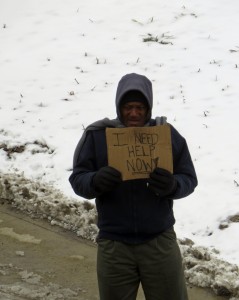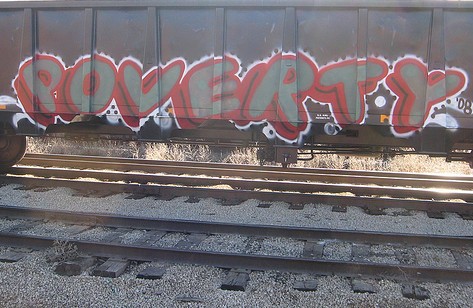Kyle Bushre is the Pastor of Outreach at King Street Church in Chambersburg, Pa. He’s an alumnus of Trinity Evangelical Divinity School and a Kern Scholar. Bushre is pursuing a doctor of ministry degree and exploring more effective ways for the church to show compassion.
Let me introduce you to Samantha and Sarah.
Samantha is a 26-year-old single mother of two children, ages nine and six. She receives $300 each month in food stamps, full medical benefits from the state for her kids, and $100 in cash assistance each month. Child support comes in sporadically, but legally enforcing it requires money Samantha does not have. The family lives in public housing. Samantha works a second shift job, but childcare is an issue even though her mom watches the kids in the evenings. Samantha’s relationship with her mother is the most important one in her life, but recently it has become strained because of how often the kids need to stay with grandma. At the end of the month, Samantha has nothing left over financially. Normally something goes unpaid, and there is not much food around. Sometimes she has a boyfriend who moves in and helps for a while, but that usually ends with the boyfriend becoming more of a financial burden than a blessing. There is usually a fight, the guy takes off, and Samantha is worse off than when she started.
Sarah loves her children and is excited to see them excel though they struggle with some learning difficulties. She finally convinced the school board to craft an independent education plan for her oldest daughter after months of red tape and pleading. Sarah struggles to make ends meet. She tries to budget, but as a waitress her inconsistent income makes it hard for her to know what she has to work with. Even though the good tips come in the evenings, she wants a day job that will allow her to be home when the kids are done with school. Thankfully, there is a new guy in her life, who is so different from the other guys in the neighborhood, who is sweet to her and helped her last month with the electric bill and a flat tire; she is hoping he may be the one.
Samantha and Sarah are the same person. Her story can be told from two different perspectives: outside in and inside out. From the outside, poverty is a lack of money that results from past choices and failure to plan. From inside, poverty is the diligent effort to love family and live securely, maybe even comfortably, with very little. A person from the middle class who lives sustainably may ask Samantha, “Don’t you see how bad your choices are?” Yet Sarah may answer, “Don’t you understand what my world is like?” The answer to both questions is probably “no.”
Generational poverty in the United States, i.e. poverty that has lasted two or more generations in a family, is not simply middle-class culture without money. It is a distinct culture with values, beliefs, and worldviews that result in behaviors that make sense within that culture. Families who interact in communities that consistently do not have the financial resources necessary to thrive generate distinct skills and philosophies for living and coping in that world. As those skills and thoughts are passed from one generation to the next, they take the form of normal life. So the cohabitating boyfriend who looks like a bad idea to the middle-class observer appears to be a source of comfort, love, protection, and finances to the single mom who has too many overdue bills to think about how this choice may affect her family over the next five years. Generational poverty is a world all its own.
 Why should this matter to the church? Loads of churches fill their websites with well-meaning phrases like “being the hands and feet of Jesus” or “giving a cup of cold water in Jesus’ name.” The idea is that the church can do something about poverty in their community, a form of compassion that is commendable. But the church that wants to reach its neighbors with the message of the gospel and see the community thrive must understand its neighbors’ culture. Offering middle-class solutions to generational poverty problems can be extraordinarily helpful, but without knowing, loving, and appreciating the venerable aspects of the generational poverty culture, those solutions will not be embraced and will fail to generate lasting change.
Why should this matter to the church? Loads of churches fill their websites with well-meaning phrases like “being the hands and feet of Jesus” or “giving a cup of cold water in Jesus’ name.” The idea is that the church can do something about poverty in their community, a form of compassion that is commendable. But the church that wants to reach its neighbors with the message of the gospel and see the community thrive must understand its neighbors’ culture. Offering middle-class solutions to generational poverty problems can be extraordinarily helpful, but without knowing, loving, and appreciating the venerable aspects of the generational poverty culture, those solutions will not be embraced and will fail to generate lasting change.
Solutions that lack understanding often result in generous, yet ill-conceived material resource ministries that perpetuate the dependency and paternalism that fuel poverty. The cycle will be broken only by those who see Samantha and Sarah as one, who take time to understand the reasons for the choices, and who respect people enough to provide guidance in appropriate ways without belittlement or judgment. The church cannot afford to engage the poor without understanding their culture.
This series is an overview of ministry among the generationally poor and draws on thoughts and models that have benefitted my own ministry as the pastor of outreach at a church in a socioeconomically diverse community. Here are the posts in the series so far and a preview of future posts:
Engaging the Culture of Generational Poverty: Calls for the church to study this culture as it seeks to work with the poor, share the gospel, and diversify the church socioeconomically.
Relationships—The Hammer that Breaks the Cycle: Compares the effects of material-based vs. relationship-based approaches to reaching the poor.
Bankrolling Social Capital: Describes the concept of social capital, and shows how this idea benefits the outreach potential of a church.
To the Poor I Became Poor: A final call for churches to see the problem of poverty with an eternal horizon and to become like the poor to reach them with the gospel.
Reflection Questions:
- Think about the ministries your church has with the poor in your community. Do these ministries generate meaningful relationships and mutual understanding? If so, how? If not, why do you think that is not happening?
- Jesus challenged his followers to spend time with people who could offer nothing in return (Luke 14:12-14). Invite someone poor to dinner and spend time getting to know and appreciate his or her world.
From the Kern Pastors Network. Image: Jennifer Woodruff Tait.












